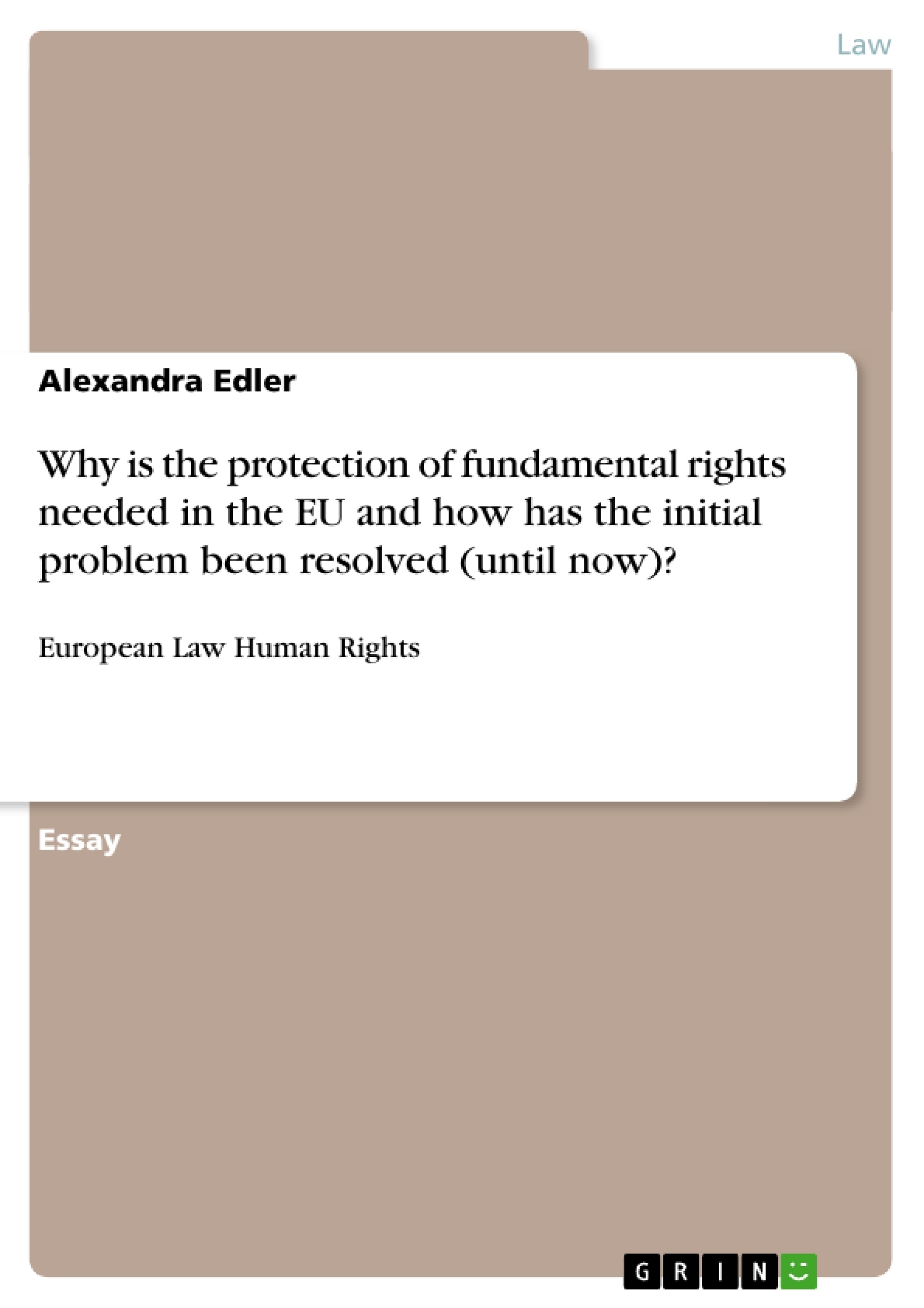Why is the protection of fundamental rights needed in the EU?
In order to demonstrate the importance of fundamental rights in the European Union (EU), it needs to be clarified what fundamental rights are and how they differ from the fundamental freedoms of the EU. When going through the literature of the European Union one might see the term “fundamental freedom”. Fundamental freedoms are embedded in the European Economic Community (EEC) since 1957 and describe the free movement of goods, persons, services and capital, the driving forces for the internal market. Even though fundamental freedoms and fundamental rights are linked and sometimes similar, Fundamental freedoms are not to be mixed up with fundamental rights which are much more focused on the citizens’ rights than on the economic factor. Fundamental rights are difficult to define as there is no common sense of what exactly is “fundamental”. Nevertheless there is different background and understanding of fundamental rights, they are generally defined as “…hierarchical supreme norms, which judicially protect citizens against unjustified interference by public authority”.2 Fundamental rights receive the highest level of protection, as they do not only speak the language of the suffered people, but also protect the rights of the nation’s citizens and are therefore essential values of a democratic legal system. Fundamental rights like human dignity, prohibition of slavery and forced labour, the respect of private and family life and the right to marry and to found a family are essential rights and represent a nations or unions values. Moreover fundamental rights ensure equality among citizens.
Inhaltsverzeichnis (Table of Contents)
- Why is the protection of fundamental rights needed in the EU?
- How has the initial problem been resolved (until now)?
Zielsetzung und Themenschwerpunkte (Objectives and Key Themes)
This paper examines the importance of fundamental rights within the European Union (EU), tracing the historical development of their recognition and implementation. It investigates why the protection of these rights is crucial for the EU's functioning and how the initial lack of a comprehensive framework was addressed.
- The nature and significance of fundamental rights in the EU
- The distinction between fundamental rights and freedoms in the EU
- The historical context and challenges in establishing fundamental rights in the EU
- The role of the European Court of Justice (ECJ) in developing and protecting fundamental rights
- The establishment and implementation of the Charter of Fundamental Rights of the EU
Zusammenfassung der Kapitel (Chapter Summaries)
Why is the protection of fundamental rights needed in the EU?
The first chapter defines fundamental rights and differentiates them from fundamental freedoms. It emphasizes the significance of fundamental rights as essential values of a democratic legal system, ensuring equality and transparency for all citizens. The chapter draws upon the historical context of World War II and the Cold War to demonstrate the imperative need for fundamental rights to foster trust and integration within the EU.
How has the initial problem been resolved (until now)?
This chapter focuses on the evolution of fundamental rights protection in the EU, highlighting the absence of a legally binding catalogue before 2007. It explores the role of the ECJ in establishing case law and safeguarding fundamental rights through its creative jurisprudence. The chapter then delves into the development and implementation of the Charter of Fundamental Rights of the EU, tracing its legal status and the challenges it faced in being accepted by all member states.
Schlüsselwörter (Keywords)
The main keywords and focus topics of this paper include: fundamental rights, fundamental freedoms, European Union, European Court of Justice, Charter of Fundamental Rights, European integration, legal protection, democratic legitimacy, case law, intergovernmental, supranational, and equality.
Frequently Asked Questions
Why is the protection of fundamental rights crucial in the EU?
Fundamental rights are essential values of a democratic legal system. They ensure equality among citizens and protect them against unjustified interference by public authorities, fostering trust and integration.
What is the difference between fundamental rights and fundamental freedoms in the EU?
Fundamental freedoms (like the free movement of goods and capital) focus on the internal market's economic factors, while fundamental rights focus more on individual citizen rights and human dignity.
What role has the European Court of Justice (ECJ) played in protecting these rights?
Before a binding catalogue existed, the ECJ developed creative jurisprudence and case law to safeguard fundamental rights as general principles of EU law.
What is the Charter of Fundamental Rights of the EU?
It is a comprehensive document that establishes the civil, political, economic, and social rights of EU citizens and residents, becoming legally binding with the Treaty of Lisbon.
How did historical events influence the need for these rights?
The experiences of World War II and the Cold War highlighted the imperative need for supreme norms that protect human dignity and democratic values to prevent future conflicts.
- Citar trabajo
- Alexandra Edler (Autor), 2013, Why is the protection of fundamental rights needed in the EU and how has the initial problem been resolved (until now)?, Múnich, GRIN Verlag, https://www.grin.com/document/233259



